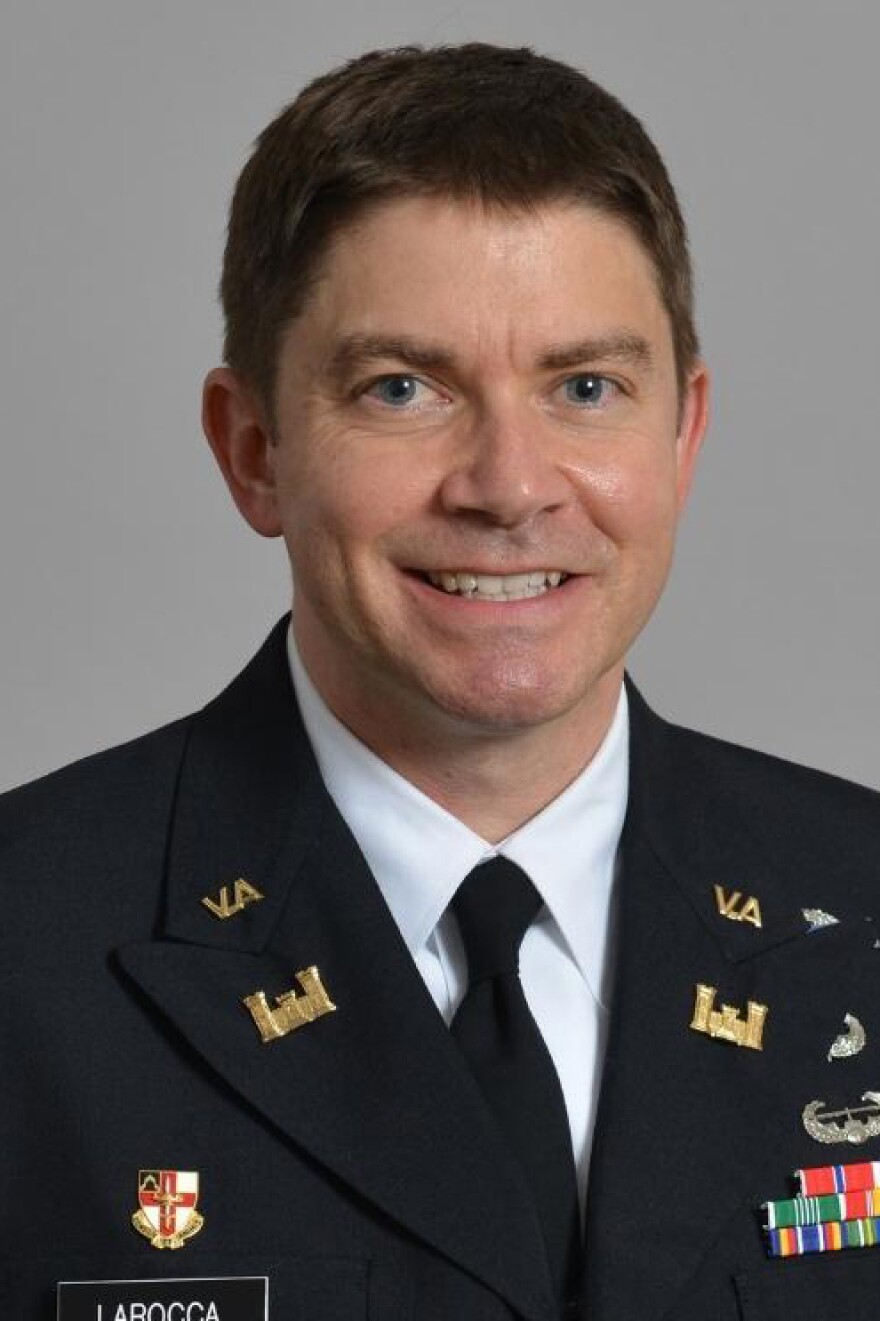Psychologists at Virginia Military Institute are analyzing data collected through a survey to help prevent veteran suicides, after a bipartisan effort to gather more information on the issue recently failed in the General Assembly.
VMI psychology professors Maj. Michael LaRocca and Col. Glenn Sullivan received a $150,000 state grant in 2023 to investigate less-examined potential factors of veteran suicide, like access to mental health services.
LaRocca explained to VPM News how the concept of leadership also could be important to prevention.
The following has been edited for length and clarity.
Dean Mirshahi: I read that you use a survey to connect with veterans for your research. Can you walk me through the process?
Michael LaRocca: Essentially, the study is looking to examine potential risk and protective factors of veteran suicide.

We've been aware of the more highly researched areas of predictors of suicide among veterans — things like substance use, poor social support, for example, or firearm access. What we're trying to do is go a step further and look at some other factors that Dr. Glenn Sullivan and I think we are in a good position to look at.
We put together a survey that looked at some broad factors, including the quality of leadership that the veterans had when they were in the service.
What did you learn? And did anything about what you learned surprise you?
We have completed the data collection, but we're in the early phases of looking at preliminary findings.
And one thing that I found — among the 240 veterans that I have data on — is that [the perception of] transformational leadership does positively associate with the veterans’ current level of psychological capital. In other words, what people's strengths are, like psychological strengths.
The way we looked at psychological capital here is kind of a composite of hope, optimism, confidence and resilience. What I found on this preliminary look is that positive ratings of leaders seemed to have helped veterans have a positive view of themselves.
This, based on the data, is associated positively with current quality of life. And then once we see that higher quality of life, the data are saying that this higher quality of life — perhaps not surprisingly — is associated with lower depression.
There have been other studies that show that these transformational leaders have a way of modeling good behaviors, which I think is especially relevant in the military, because military units tend to be quite closely knit — there's a lot of cohesion, and they go through a lot of major stressors together. That quality of leadership can really be a powerful protective factor against psychological distress for a service member or veteran.
If service members have that leader who's supportive and models healthy coping mechanisms and encourages service members to ask for help and to use social support — and to not isolate and not use substances — I think that those leaders really set up these service members and veterans to have a long-term psychological benefit.
What are you hoping the research could eventually be used for? And how could it help veterans and service members?
One of the reasons I'm excited about this is it addresses something that, as a veteran myself, I have always believed was important in the service member experience: how these leaders shape you.
I was fortunate to have very positive and inspirational leaders. But it also makes it easy for me to see that in the military unit that goes through hardship and is very closely knit, an unsupportive leader would also be very strongly felt.
In treatment settings, when veterans are talking about current psychological distress — depression, PTSD, even things like substance use — I think it's at least worth having a conversation about the quality of leadership they had, even if it might have been many years ago. How that veteran views themselves and others and the world — and how they view the future — might have been influenced by that leader.
If that person had an unsupportive leader, then perhaps that veteran now has issues with trust. Maybe they feel like their trust was violated. Perhaps now the veteran might be mistrustful of other authority figures or leaders. Perhaps this could affect engagement and treatment, because the doctors or clinicians could be seen as a kind of leaders.
[One] of the things I've tried to talk about in my previous research is that the military can take a note from this and say that leaders should be thinking about not just the short-term impact they have on mission accomplishment, but kind of the long-term psychological impact that they may have on service members and veterans.
We want these leaders to do right by their followers. And I think a psychologically healthy unit will not only accomplish the missions effectively, but they'll be taking care of their soldiers in the long term.
What made you decide that veteran suicide prevention was something that you wanted to help address?
It is alarming. Nearly 50,000 Americans die by suicide each year, and about 1 in 5 of those decedents are veterans. We know that veterans have elevated risks of suicide, even after adjusting for age and sex differences.
So, it's a significant problem that I would like to learn more about — and perhaps, through [our] findings, to have a positive impact on treatment settings and leadership.
Having served in the Army and deployed to combat, I noticed how much distress there was around me in my unit. We suffered some loss when we were deployed, and it really impacted me — in terms of how important cohesion is and how important it is to be able to manage stressors in the military and in combat.
I'm hopeful that current military leaders, and the military itself, can continue to destigmatize mental health and encourage help-seeking behavior.
Mental health and suicide prevention resources
In emergency situations, call 988 or 911.
National Suicide Prevention Lifeline: 1-800-273-8255
- Deaf or Hard of Hearing? 1-800-799-4889
- En Español: 1-888-628-9454
Mental Health America of Virginia Warm Line: 1-866-400-MHAV (6428)
- Monday to Friday, 9 a.m. to 9 p.m.
- Saturday, Sunday and Holidays, 5 p.m. to 9 p.m.
- Spanish Services (Friday and Saturday), 5 p.m. to 9 p.m.
- Text/Chat Support (Wednesday, Friday, Saturday), 5 p.m. to 9 p.m.
Veterans Crisis Line & Military Crisis Line: 1-800-273-8255, Press 1
Crisis Text Line: 741-741












